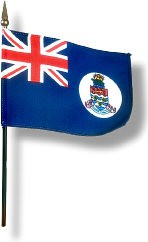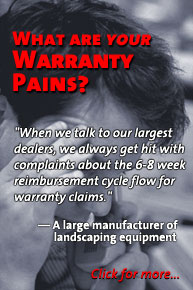December 1, 2003 |
ISSN 1550-9214 |
Extended Warranties:The default of Warranty Gold Ltd. on the heels of the collapse of its Cayman Islands-based underwriter puts into question whether online sales of vehicle service contracts are worth the risk, and whether the risks were underpriced.
Industry executives were astonished -- not only at the speed at which the NWIG situation went from good to bad, but also at the assertions made by Warranty Gold since then that it was not going to pay any claims administered and/or underwritten by NWIG. This is a line that few companies ever dare to cross. In the case of others who relied on NWIG as an underwriter, such as the 5,000 auto dealers who sold policies under the Smart Choice brand name, the cost of honoring claims was usually absorbed by the dealers themselves. But with the Warranty Gold business model, in our opinion, there are not only no dealers, but also no honor. Warranty Gold referred all questions to its attorneys, who ignored requests for comment. Warranty Gold's president and CEO is Michael Kammerman. The attorney handling the company's bankruptcy proceedings is Timothy J. Herman of Herman, Howry & Breen LLP. Someone at the company or its law firm is now making assertions about who will ultimately take the loss. On one page, Warranty Gold states that the 67,000 contracts are "unenforceable." On another page, it says "those contracts have been effectively terminated by order of the federal court." However, service contracts sold since June 7, because they are underwritten and administered by another company, "are fully effective and enforceable," the company asserts. Years ago, analysts wondered whether anyone would ever buy something as large and expensive as an automobile through an Internet-based electronic commerce site. Following this default, we can only wonder whether anybody will ever again feel confident about their purchase of an extended warranty through a Web site. It's not that electronic commerce is inherently any more or less secure than in-person commerce. It's just the way that many of these online merchants seem to hide behind their URLs and their lawyers when there's trouble. Numerous consumer advocates advise people not to buy extended warranties at all. After this default and earlier Warranty Week reports on WarrantyByNet Inc. and Continental Warranty, we can narrow that advice down considerably to this: it is our opinion that extended warranties should not be bought from dot-com companies that won't publish their physical address or the names of their executives. Meanwhile, both Warranty Gold and others affected by the collapse of NWIG are encouraging the victims to take it up with NWIG's liquidators. The problem is, NWIG is nominally based in the Cayman Islands, a British colony in the Caribbean Sea about halfway between Cuba and Central America. Although NWIG's corporate offices were in Lincoln, Nebraska, the company chose to file for what the British call provisional liquidation in the Caymans. It was only then that people began to understand how unique their situation was. Flag of Convenience
Risk retention groups came into existence in the U.S. in the 1980s as a way for those who could not find affordable insurance to join with others in the same situation. Companies such as Warranty Gold and SC&E Administrative Services Inc. (one of the marketers behind the Smart Choice service contracts sold through auto dealerships) joined the RRG as members, and then relied on it to insure the service contracts they wrote. In some cases, they also delegated the role of administrator to NWIG. Each RRG must choose a state in which to domicile itself, and must then follow all the insurance laws and regulations of that state. The problem is, even before RRGs were created, NWIG already existed in the Cayman Islands. So it didn't have to choose a state. It was "grandfathered" in as an offshore RRG, so it apparently conformed to the insurance laws of no state. In the warranty food chain, NWIG functioned as the underwriter of service contracts and sometimes as administrator. But it was always a member company such as Warranty Gold or SC&E Administrative Services that actually sold the contract to a vehicle owner. RRGs insure their members. But they can't write a contract directly with a consumer. So there were always two separate contractual relationships: one between NWIG and its members, and one between these members and their clients. Warranty Gold and SC&E are leaving consumers with the distinct impression that they have recourse to funds held by NWIG. However, NWIG's liquidators have their own Web site, at which they say this is simply not the case. Follow the MoneyRichard L. Piersol, the business writer at the Lincoln Journal Star, has written more about the money trail left by NWIG, SC&E, and Warranty Gold than perhaps any other journalist in the world. It was his June 7 article about the insolvency of the National Warranty Insurance Company RRG, based locally to him in Lincoln, Nebraska, that first detailed the dispute NWIG had with the Pacific Fiduciary Investment Corp. over claims on high-mileage "Smart Choice" auto policies sold by the Delta Group's SC&E Administrative Services (owned by Yamagata Warranty). Unlike all the attorneys involved in the case, Piersol declined to point fingers at anyone, explaining that he cannot offer his opinions without jeopardizing his ability to continue reporting on the matter. "I think I'd just as soon have the pieces I write speak for themselves," he said. The only problem is his newspaper's newsarchives contain just the NWIG articles he's written in the past 30 days (actually, it's 90 days -- the oldest still online as of Dec. 1 is from Sept. 7). Readers looking for the latest articles can go to the Journal Star home page and type either Piersol or NWIG into the "search journalstar.com" box on the top left. Readers looking for all the older articles must call the newspaper's librarian at +1 (402) 473-7295. Others reporting on the collapse of NWIG and Warranty Gold include the Austin Business Journal, the Austin American-Statesman, the Insurance Journal, ConsumerAffairs.com, Cayman Net News, Automotive News, and the Wall Street Journal. One bibliography of these articles is online at an Extended Warranty Buyer's Guide Web site, while another is on a Warranty Gold-sponsored Web site. But Piersol by far has the best and most comprehensive reporting on the subject. Piersol said that when he initially heard of NWIG's collapse, he looked in the newspaper's newsarchives to see what the files contained about the company. There wasn't much, save a few paragraphs on past company expansions and moves to larger quarters in the late 1990s. "They kept a very low profile," he said, even though they employed 180 people locally, did business nationally, and were in fact based internationally. Piersol said he began to understand how big a story this was when he found out that NWIG backed at least a million policies over its lifetime. "I don't know what proportion of the automotive service industry this represents, but I know it's not small," he said. "As I talk to people around the country, it's obviously caused a lot of distress in a lot of quarters." Do the Right ThingNow that distress has spread even further, leaving 67,000 Warranty Gold customers with less options than even the 900,000 "Smart Choice" policyholders. Unlike SC&E, Warranty Gold sold its service contracts directly to consumers through its Web site. This cut out the automobile dealerships as middlemen, meaning that these contracts were strictly between Warranty Gold and the customer. In contrast, SC&E sold its policies to consumers primarily through automobile dealerships. In some states, this requires the dealerships to pay claims even if their administrator and/or underwriter do not. In other states, this is not required, although most do the right thing and pay the claims anyhow.
California also has the Song-Beverly Consumer Warranty Act, also known as the Lemon Law, but that law has more to do with the product warranties expressed and implied by a new motor vehicle sale. The California Civil Code, especially Section 1794.4, contains additional regulations governing the sale and administration of service contracts. In all, the California Department of Consumer Affairs lists four state agencies with jurisdiction over different facets of extended warranty/service contract regulations. Kan Donohoe, an attorney with Kemnitzer, Anderson, Barron & Ogilvie LLP, specializes in California Lemon Law and class action litigations on behalf of consumers. She said the law firm is now suing a dealership for continuing to sell service contracts administered by Risk Protection Management Inc., which went out of business a year ago. In November 2002, the California Department of Insurance issued a cease and desist order against RPM Inc., alleging that the company had never been licensed in any capacity and therefore was selling its extended warranties illegally in the state. Donohoe said she couldn't comment on the specifics of the NWIG/Warranty Gold case, primarily because the laws governing service contracts differ from state to state. In addition, because of the CDI's rules outlined above, Warranty Gold does not do business in California. However, based on her experience with similar cases, she was willing to make one prediction. "It's going to be very difficult to get your money back from Warranty Gold," she said. In general, Donohoe said, "the average consumers think that when they buy an extended warranty, that it's backed by either the dealer or the manufacturer. This is not always the case. Consumers need to read every single document that's put in front of them when they sign, and they need to ask who is this service contract backed up by." When a potential client calls her office, the first thing she asks them is the name of the administrator, as it's written in the contract. "When consumers complain about extended warranties, they're not going to know they're complaining about a warranty administrator," Donohoe added. "They think that they're complaining about either the manufacturer or the dealer. Then they find out it's a third party. That's a problem. I guess it's the way the dealers refer to these service contracts as extended warranties. They make it seem like more than it really is." The Midas TouchWarranty Gold always has been very clear to explain that it bypasses the dealers during the sales process. One reason the company said its contract prices were as much as 60% lower than those sold through dealerships was because the direct online business model cut out the middleman and his markup. As we now see, however, what also was cut out was the willingness (or the ability) to pay claims in the event of an underwriter's collapse. Bypassing the dealerships also forces their service bays out of the loop. Consumers coming in to such a service operation with a repair job and a promise to pay from Warranty Gold have no more leverage than somebody coming in with a promise to pay from Visa, MasterCard, or the bank whose name is on their personal checks. Indeed, the local newspapers are filled with tales of cars being held hostage until full payments are made for repairs -- the so-called mechanic's lien. Michael Blumberg, the chief operating officer of D.F. Blumberg Associates Inc., said that dealers add more than their own markups to the extended warranty equation. They also add their service bays to the mix, and stake their local reputation in the community on their ability to fix a vehicle at a fair price. "I think the pricing was a function of the infrastructure," Blumberg said. "I don't see the Internet or the Cayman Islands as the issue." The biggest problem, he said, was the fact that the entities actually fixing the vehicle had no legal or financial connection to either the customer or the dot-com seller of the service contract. "You have to build solid relationships, first in going to market, and then in service delivery. They didn't have the channel -- the people who make good on the warranty -- bought in. If they had the repair shops selling the warranties, it would have created a symbiotic relationship." Manufacturers also may now take a more active interest in the process, Blumberg predicted. While they're not often part of the contract or the service, it's their name on the back of the vehicle, and their reputation that's also at risk. Following this collapse, Blumberg said he sees the possibility of manufacturers taking more control of the warranty process, and instituting policies to prevent this from happening again. This may not be good news for consumers, at least in the short term. "I can see manufacturers putting in policies that minimize choice," Blumberg said. They may begin to recommend preferred providers, or even go further and restrict franchised dealers to an approved and authorized list. Less choice means less competition, and that usually means higher prices. "But that's part of the backlash. Because this happened, the onus will be placed on the dealers, which in turn will be put on the label. I think this might force the manufacturers to see service more strategically, to be able to find the intangible value in service, and offer new solutions." Burt Shaw, president of the Consumer Products Division of Warrantech Corp., noted that in the past, other sellers of extended warranties have lost their insurance coverage for one reason or another. But they still paid claims. Therefore, not paying legitimate claims is not only unusual -- it's also injurious to the collective reputations of all industry players. It's something that happens only every few years, but it always hurts a lot of honest and scrupulous companies. "Any negative event -- any type of default -- is a black eye on the warranty business, period," Shaw said. "We go to great lengths to make sure it doesn't happen, by making sure we use A-rated companies and U.S.-based companies to reinsure our contracts. That's part of the reason for the Service Contract Industry Council, to ensure financial stability for its member companies. We take great pains to make sure we're in compliance with all that, to prevent just this from happening. We pay significant claims, and we try to keep all of our programs above board. I hate to hear about anything like this, because for the industry it fuels the fire that there's something insidious or sinister about a product protection program." Bypassing Dealer ExperiencePatrick Donahue, president of the Aon Warranty Group's First Extended Service Corp. and past president of its Resource Dealer Group, said he sees the use of a risk retention group as an underwriter to be a fundamental flaw. The use of a "stateless" offshore RRG such as NWIG only magnifies the risk. However, Donahue said he also sees the online sales model as a major risk for consumers. They buy on price, only to find out that the price didn't reflect the risks. "It is a very unfortunate and expensive lesson in an industry that is generally sound," Donahue said. "But there are exceptions. And those exceptions are more likely to catch the individual consumer who buys online, and who may not have gone through the research that an automobile dealer would typically go through before he selects his service provider." "The vast majority of service contracts are sold through franchised or independent auto dealers," Donahue noted, "who have 30+ years of experience in the service contract industry. They have seen failures. They know there are stable providers, safe harbors, and riskier ways of conducting business." That's not to say that some won't occasionally tie up with an administrator or underwriter that fails. But Donahue sees heavy risks for consumers if they cut out the dealer/middleman as a way to cut the price. In his opinion, they also lose the benefit of having an experienced professional checking out the references of the administrator, the underwriter, and the reinsurer. "I think whenever you have a failure, it is a warning to the industry," he said. "I think if you are looking for a warranty that is priced substantially below the balance of the market, you are buying into a future problem. It is reasonable to say that everybody has the same loss cost for providing coverage. If a vehicle fails, the parts replacement and the labor involved is going to be comparable. Most companies have found ways to be efficient in the administrative services they provide and the development services they provide. And so, within a range, most contracts are fairly closely priced." Warrantech and Aon Warranty, along with NEW Customer Service Companies Inc., are founding members of the SCIC. As Fred Schaufeld of NEW told Warranty Week in a March 3 column, consumers have never been burned by the insolvency of an SCIC member. Someone always pays the claims. "The number one concern in our business," he said, "is that there's financial solvency to pay claims." Warranty Gold, even after its default, makes a point of stressing that its prices are as much as 60% lower than is typical with a dealer-sold service contract. They say it's because the direct-to-consumer sales model bypasses the dealers, and therefore their markup. But others such as Aon's Donahue say it has more to do with an underpricing of the risks involved -- something the average consumer is not in a position to detect. Dealers, he said, would be in a better position than consumers to know when a quoted price is too good to be true. "The first thing to do is to do some research on the company that stands behind the product," Donahue said, "and in most cases consumers can feel reasonably confident that their auto dealer has done that research on their behalf. In the event that there is a failure as a result of that dealer having made a bad choice, that dealer more often than not steps in and protects his customer. That's different than buying online, where there is no intermediary to step in." Insurance vs. Risk Retention GroupsLinda Gottschalk, vice president of marketing at the Warranty Corporation of America, said consumers may not understand that there are meaningful differences in the way service contracts are sold or insured. "The fundamental difference is there are insured products, and then there are products backed by risk retention groups," she said. "And therein lies the huge difference. Those of us at companies that work hard to provide first-class insurance backing for our clients and their customers are careful about who we choose to insure our products, because we don't want that kind of thing to happen. People who went down the path of risk retention partners thought they could not only safeguard their customers, but also make a little more money on the deal. You get what you pay for. Isn't that the truth?" Gottschalk also suggested that the Internet business model may have contributed to Warranty Gold's collapse, but not just because they eliminated the middleman from the sale. Without a local dealer to actually inspect the vehicle, she noted that the online company is selling a contract on a vehicle it has never seen. Therefore, consumers driving high-mileage jalopies with numerous pre-existing conditions may have gravitated to the online sellers, knowing that the day after their waiting period ends they can make a claim. Whatever the cause -- inadequate reserves, unexpectedly high claims, underpriced risks -- Gottschalk said she sees this collapse as a challenge for all service contract providers. "Obviously, it's a tragedy for the industry," she said. "Everyone else is trying to do an outstanding job. This tarnishes the consumer's perception of what we do." Now You Tell UsConsumers relying on the Web for their research and fact-checking might not discover the risks of going with an RRG-backed company until it's too late. Most of the online advice we've seen consists of thinly-disguised advertising by Web sites that live off the resulting referrals. Some carry old or inaccurate ratings for the associated service contract underwriters. Others invite the reader to confuse the ratings of the underwriter and the reinsurance company. None pointed out the RRG structure or the Cayman Islands connection as risks until NWIG's liquidation process began in June. Now, even Warranty Gold's own advice column counsels against RRGs. "Remember that lower price sometimes means higher volume and that higher volume may create future liability that exceeds cash reserves and reinsurance limits with little hope of protection for the consumer," the company's online FAQ now suggests. So how was even the most studious consumer to know about the risks of RRGs and/or NWIG? Earlier this year, the insurance carrier rating agency A.M. Best Company Inc. still listed NWIG as a Nebraska-based company. Many extended warranty companies wouldn't dream of having anything lower than an A-rated carrier as their underwriter, and several give out this piece of advice repeatedly. However, A.M. Best rated NWIG as A- (Excellent) until March 7, 2003, when it downgraded the company to B++ (Very Good). It was downgraded again to B (Fair) in late May, only two weeks before the company was placed into liquidation by a Cayman Islands court. Therefore, people shopping online and doing their research before March 7 could have verified NWIG's A- rating and still found their policies worthless three months later. Furthermore, what value would it be to a current policyholder to know about a carrier's downgrade? Unlike a bond or a promissory note that goes from investment-grade to junk status in just a few months, an extended warranty cannot be traded on the open market or sold for pennies on the dollar to an investor that speculates in distressed companies. A person who bought and paid in full for a seven-year policy in early 2003 is stuck with it for the duration, whether the underwriter's rating climbs or falls in the interim. In this case, at least, it also wouldn't have helped to look for an underwriter with a stable rating. Warranty Gold now notes that some RRGs are younger than the policies they back, so their number-crunchers lack the multi-year data that would help them to price risks prudently. However, A.M. Best initially assigned the A- to NWIG back in 1998, so even those looking for stability and longevity in the ratings would have found a five-year track record of excellence for NWIG. Once NWIG's liquidation process began in June, Warranty Gold quickly switched underwriters to the Dealers Assurance Company. Their A.M. Best rating also is A- (Excellent). As Warranty Gold now claims on its Web site, "You can feel confident that proper reserve amounts are being set-aside today with a direct insurer that has the financial stability to pay claims in the future." Hiding Behind Their URLsNumerous online sellers of extended warranties seem to avoid disclosure of their physical location. Most use (800) telephone numbers, post office boxes, generic email addresses (sales@company.com) and "contact us" Web forms that avoid giving away any more than the most vague and general location information. It is our opinion that this omission is intentional. One can see the value of such anonymity in the case of Warranty Gold. For while we can surmise they're based somewhere in Texas, most probably in Austin, how can we be sure? They won't even return our phone calls, so we can't even use Caller ID to pin them down to a specific area code. SC&E Administrative Services, DeltaGroup, and others involved in the NWIG collapse also can remain vague about the locations of their offices. But the dealers who sold their service contracts cannot so easily hide from the wrath of their customers. To remain in business, they have to sell cars -- sometimes to second- and third-generation customers. This would not be so easy if there were picketers walking outside their offices and broken cars blocking their driveways. Indeed, many Smart Choice dealers have absorbed the cost of honoring the claims themselves, in part to avoid the bad public relations of telling their customers to send their claims to some post office box. | ||||||
|


 When the National Warranty Insurance Risk Retention Group filed for bankruptcy in June, it set off a chain of events that keeps growing. Almost immediately, Warranty Gold Ltd. stopped paying claims on some 67,000 NWIG-backed policies. On Nov. 11, Warranty Gold itself
When the National Warranty Insurance Risk Retention Group filed for bankruptcy in June, it set off a chain of events that keeps growing. Almost immediately, Warranty Gold Ltd. stopped paying claims on some 67,000 NWIG-backed policies. On Nov. 11, Warranty Gold itself  National Warranty is a risk retention group -- not an insurance company. Furthermore, it is a risk retention group domiciled in the Cayman Islands, where everyone from bankers to shipping companies go to enjoy not only the sun and the scuba diving, but also the alleged inattention of the regulators that would follow their every move back home. According to the
National Warranty is a risk retention group -- not an insurance company. Furthermore, it is a risk retention group domiciled in the Cayman Islands, where everyone from bankers to shipping companies go to enjoy not only the sun and the scuba diving, but also the alleged inattention of the regulators that would follow their every move back home. According to the  In some states, the sale of service contracts through anybody but a dealership is illegal. The California Department of Insurance has an online
In some states, the sale of service contracts through anybody but a dealership is illegal. The California Department of Insurance has an online 



